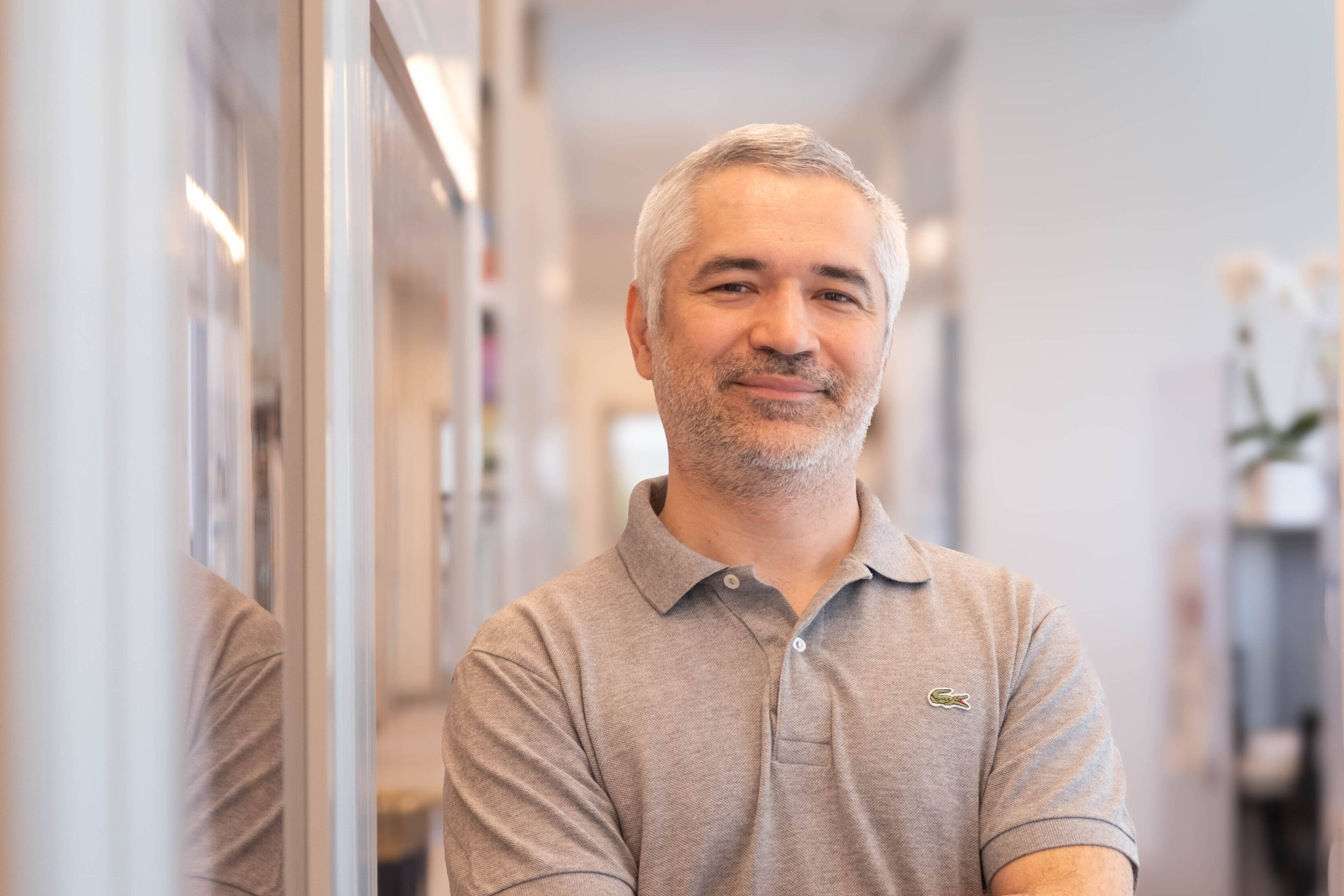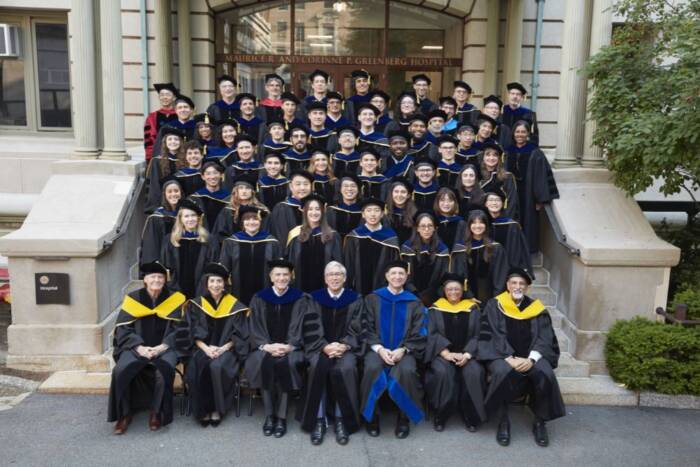Rockefeller boosts its wellness offerings
by Alexandra MacWade, assistant editor
 (opens in new window)
(opens in new window)
Fitness trainer and manager Timothy Blanchfield leads a free exercise class at the gym in Founder’s Hall.
“Your head is down and you’re gritting your teeth and you’re pedaling hard,” says Timothy Blanchfield, describing what it’s like to be in one of the spin classes he teaches at Rockefeller’s fitness center. Mr. Blanchfield, a triathlete who has been a personal trainer for more than 25 years, leads about a dozen(opens in new window) free—and very popular—exercise classes each week that are open to all Rockefeller employees, regardless of fitness level. “You’re burning calories, feeling good, and getting oxygen to your lungs,” he says.
As Rockefeller’s first fitness trainer and manager, Mr. Blanchfield encourages employees to be more active, teaching them how to use the free weights and cardio equipment in the gym and helping them with their training regimens. He joined Rockefeller a little over two years ago as part of a larger effort to enhance the university’s wellness initiatives, spearheaded by Virginia Huffman, vice president of human resources. Rockefeller has expanded the wellness lecture series(opens in new window), introduced classes on meditation and mindfulness(opens in new window), and recruited Mr. Blanchfield, nutritionist Kim Ross, and, most recently, nurse practitioner Ashley Foo.
“This is a community that works hard and strives toward excellence,” says Ms. Huffman. “And we’re committed to helping everyone lead happier and healthier lives.” Containing costs is also a key goal of this effort. Citing rising medical expenses and increasing costs associated with the Affordable Care Act, HR announced at the end of last year that Rockefeller was switching health insurance networks for employees. Fostering employee health through the wellness program could not only lead to a healthier and more productive staff, but it might also help to curb surging insurance costs.
Diagnosing and treating
Rockefeller’s Occupational Health Services(opens in new window) Office has long provided vaccinations, blood pressure checks, referrals, wellness screenings, and travel health counseling for employees. They perform new employee health assessments and mandatory medical checks for certain university staff, such as those whose work may expose them to specific hazards. They also offer help to quit smoking. But before Ashley Foo arrived in January, employees who stopped by OHS because they felt sick were almost always referred elsewhere.
“My role is completely new,” says Ms. Foo, who worked as an ER nurse at NYU before joining Rockefeller as director of OHS and becoming its first nurse practitioner. In addition to evaluating and examining patients, nurse practitioners can diagnose and treat them. They can also prescribe medications.
“We don’t want to replace your primary care office, but we can serve as an adjunct to your doctor,” she says. “And if you’re not feeling well, Occupational Health can be your first point of contact. We’re right here on campus, and there’s no co-pay.”
Since her arrival, Ms. Foo has treated employees suffering from bronchitis, asthma attacks, ear and sinus infections, and allergic reactions. If someone requires more involved care, she will consult Head of Laboratory Thomas Sakmar, the office’s collaborating physician.
An on-site clinic
Ms. Foo, who earned both her undergraduate and graduate nursing degrees from NYU, hopes to form strong relationships with Rockefeller staff. “Everyone who comes here is my patient, and I want to take good care of them,” she says. She is particularly interested in helping her patients manage chronic conditions and making sure that everyone she sees is connected to a primary care physician and appropriate specialists.
Working with Weill Cornell Medicine, Ms. Foo has begun strengthening OHS’s referral database. Now, in addition to using word-of-mouth recommendations, she has access to the database that Weill Cornell primary care physicians use to refer their own patients to specialists, including mental health professionals. “Having a strong relationship with Weill Cornell’s network is going to go a long way toward making sure that people are linked to the care they need,” she says.
It is also another way that HR is hoping to curtail health care costs for the university, as all of Ms. Foo’s referrals are considered in-network providers under Rockefeller’s employee health insurance plan.
Ms. Huffman’s vision for OHS is for it to become an on-site clinic. Beginning this month, psychiatrist Daniel Knoepflmacher will provide no-cost, short-term counseling in OHS for employees struggling with conditions including stress, anxiety, and depression. Dr. Knoepflmacher, who is assistant professor of clinical psychiatry at Weill Cornell Medicine and assistant attending psychiatrist at New York–Presbyterian Hospital, can also counsel those seeking help with crisis management and relationship issues. There are also plans to bring a physical therapist on board.
“We care about our employees,” says Ms. Huffman. “We want to provide as many tools as we can to help them feel their best.”
Staying on track
Ms. Foo often makes campus-specific recommendations to people who see her at OHS. For help handling stress, she points them to mindfulness classes. For physical training advice, she suggests they visit Mr. Blanchfield at the fitness center. And for help with diet and nutrition, she sends them straight to Kim Ross.
“Nutrition can help any physical problem you have,” says Ms. Ross, who conducts 50-minute counseling sessions and unlimited follow-ups for members of the Rockefeller community. People can schedule free sessions with her to help manage weight, optimize physical training regimens, or address fertility issues, which is one of her specialties. “It’s not just high cholesterol, high blood pressure, and diabetes. Everything from skin disorders and headaches to autoimmune diseases and allergies can be affected by what you eat. Any ailment you have, even something like depression, can be helped by diet,” she says.
Ms. Ross, who received her master’s degree in science nutrition from NYU and has a private practice in Manhattan, assesses her clients to see if their diets are working for them. Together, they create a tailored eating plan. Many people, especially those with chronic conditions or weight loss goals, find follow-up visits help them stay on track.
“People generally know what they should be doing, but sometimes they need a little motivation,” she says. She tells her clients that big changes come by making small adjustments over time. “Start by eliminating one thing from your diet for a month. It might be sugar,” she says. “You can still have your burger and fries, but now you’ve eliminated sugar. And all of a sudden, everything starts to change.”
A wonderful cycle
Ms. Ross has been working with Restaurant Associates to introduce healthy menu options in the cafeterias and bring new vending machines to campus that sell nutritious snacks and drinks. She has also lectured on several different topics as part of the wellness lecture series, giving talks on enhancing performance in the workplace, buying organic food, eating during the holidays(opens in new window), and navigating fad diets(opens in new window).
“When people are healthier, they’re usually happier and more productive,” she says. “When you eat better, you start to feel great. When you feel great, you might be more inclined to work out. It’s this wonderful cycle.”
Email(opens in new window) Timothy Blanchfield with questions about the fitness center. Occupational Health Services is located in Room 118 of the hospital. Call x8414 for more information or to schedule a confidential counseling appointment with Daniel Knoepflmacher. To book a consultation or follow-up appointment with Kim Ross, call x7788.


